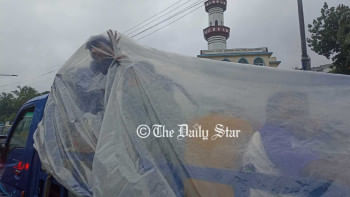New curriculum rolls out, preparations not enough

The new curriculum that takes effect today might be off to a haphazard start as the teachers have not been brought up to speed with the vastly different programme.
With a view to better preparing children for the challenges of the modern world, the government has overhauled the curriculum to enable students to acquire competencies like communication, listening, and analytical and problem-solving skills.
Students of classes 1, 6 and 7 will get books based on the new curriculum from today. For students of classes 2, 3, 4, 8 and 9, the new curriculum will take effect in 2024. Class 5 and 10 students will get new books in January 2025.
Before a curriculum takes effect, teachers are given training and provided with a guide to equip themselves to effectively deliver the syllabus.
But the new curriculum, which aims to wean off students from rote memorisation, has not been piloted at the primary level due to delayed release of funds.
Neither were the primary teachers given any training on how to implement the curriculum nor were they given a teacher guide. Besides, secondary teachers were given only a two hour long online curriculum dissemination training, NCTB officials said.
Teacher guide and curriculum orientation trainings both very important steps for the implementation of a curriculum, said Mohammad Tariq Ahsan, a member of the Curriculum Development and Revision Core Committee.
There are 4.03 lakh teachers at about 1.19 lakh schools and kindergarten teaching more than 2 crore students, according to the directorate of primary education.
"There will be a big change in the teachers' role in the new curriculum and their training should be of utmost priority," said Ahsan, who teaches at the University of Dhaka's Institute of Education and Research.
The National Curriculum and Textbook Board is now working on the final draft of the online training material for primary teachers, which is likely to take place by January 15, said AKM Reazul Hassan, NCTB member (primary curriculum). He said they have not published the teachers' guide as it was not sought by the authorities. But these guides for primary teachers will be available online.
The two-hour online training could not take place as the primary teachers were busy with scholarship exams, he said, adding that the in-person five-day training will be completed within three months.
Asked about the reason of not holding piloting for primary level, Hassan said: "We got the money in April and then came Ramadan. So, we could not start the process on time. But we don't think the teachers will face any kind of difficulties as the outgoing curriculum for the primary level was already competence-based."
Usually, the textbooks published in the first year are experimental editions and see the necessary revision in the following year's print run. So, there will be scope to revise the books if needed, Hassan added.
The situation is marginally better at the secondary level.
The curriculum, which focuses on activity-based learning, has been piloted at 62 secondary schools, and the teachers have already been provided with a guide.
But secondary teachers were given only a two-hour subject wise training and authorities failed to hold five-day physical training. So, the teachers will not face too many problems in delivering lessons in the classroom," said Moshiuzzaman, NCTB member (curriculum).
He blamed late release of funds for not having physical training for secondary students ahead of starting of implementation of new curriculum. He said teachers will not face too many problems in delivering lessons in the classroom as they have subject-wise training and teachers' guide in hand.
There are 2.37 lakh teachers at 18,874 secondary schools teaching 89.30 lakh pupils, according to the Bangladesh Bureau of Educational Information and Statistics.
In the new curriculum, there will be no public exams before class 10 and no exams of any kind for students up to class 3.
SSC exams will take place for only five subjects.
HSC exams will take place in two phases after classes XI and XII based on the curriculum of the respective classes and the final result will be determined by combining the results of both phases.
Under the existing system, students of classes 9 and 10 take the SSC exam on 10 papers after studying a syllabus for two years. They sit for the HSC exams on 12 papers after studying a two-year syllabus in classes 11 and 12.
It is also going to introduce streams -- science, humanities and business studies -- from class 11. In the existing curriculum, students had to choose the streams in class 9.
The number of subjects for students will be reduced. There will be no textbooks but study materials for the two-year pre-primary education. Students from Class 8 to Class 10 will get 10 books. Currently, these students read 12 to 14 books.
Students would be evaluated based on regular school work until class 3. From class 4 to 8, 60 percent of the evaluation for Bangla, English, mathematics, social sciences and science will be done through school work and the rest through exams.
The curriculum was last revised in 2012.

 For all latest news, follow The Daily Star's Google News channel.
For all latest news, follow The Daily Star's Google News channel. 



Comments